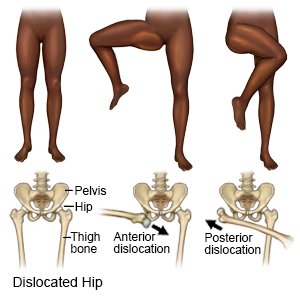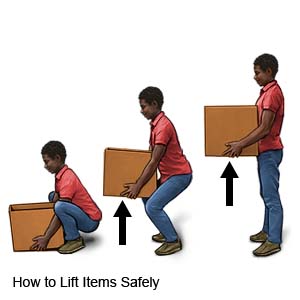Hip Dislocation
Medically reviewed by Drugs.com. Last updated on Apr 6, 2025.
What is a hip dislocation?
A hip dislocation occurs when your thigh bone is forced out of your hip socket.
 |
What are the signs and symptoms of a hip dislocation?
- Severe pain
- Not being able to move your leg
- Hip or knee twisted in or out
- Numb foot, ankle, or leg
How is a hip dislocation diagnosed?
Your healthcare provider will examine you. X-ray or CT scan pictures may show a dislocation, fracture, or other injuries. You may be given contrast liquid before the pictures are taken to help healthcare providers see the pictures better. Tell your healthcare provider if you have ever had an allergic reaction to contrast liquid.
How is a hip dislocation treated?
- Pain medicine may be needed.
- Reduction is used to move your thigh bone back into the socket of your hip joint. Closed reduction is a procedure to rotate your leg and move your hip in different positions. If closed reduction does not work, open reduction may be needed. Open reduction is surgery done through an incision.
How can I prevent my hip from dislocating again?
Follow these precautions for 6 weeks after your injury or as directed:
- Sit with your back straight and your feet flat on the floor. Do not cross your legs. Do not lean forward when you sit in a chair.
- Keep your knees apart. Place a pillow or wedge between your knees when you sit or lie. Do not twist your knees. Do not lift your knees higher than your hips.
- Do not sit in a low chair. Use armrests and your upper body strength to push yourself up from a sitting position.
- Do not bend at the waist to pick up an object from the floor. Bend your knees to reach the object, or use a tool to pick it up.

How can I manage a hip dislocation?
It will take 2 to 3 months for your hip to heal.
- Use a walker or crutches as directed. Ask your healthcare provider or orthopedist when you can put weight on your injured side. As your hip heals, use a cane to help you walk until your limp goes away.
- Avoid high-impact activities and sports. Do this for 6 to 12 weeks or until your hip strength has returned.
- Go to physical therapy, if directed. A physical therapist teaches you exercises to increase the range of motion in your hip. Exercises also make your hip stronger and decrease pain.
When should I seek immediate care?
- You have severe pain.
- You dislocate your hip again.
When should I call my doctor?
- You have a fever.
- You have pain that does not go away after you take pain medicine.
- You cannot walk well with your cane or crutches.
- You have questions or concerns about your condition or care.
Care Agreement
You have the right to help plan your care. Learn about your health condition and how it may be treated. Discuss treatment options with your healthcare providers to decide what care you want to receive. You always have the right to refuse treatment. The above information is an educational aid only. It is not intended as medical advice for individual conditions or treatments. Talk to your doctor, nurse or pharmacist before following any medical regimen to see if it is safe and effective for you.© Copyright Merative 2025 Information is for End User's use only and may not be sold, redistributed or otherwise used for commercial purposes.
Further information
Always consult your healthcare provider to ensure the information displayed on this page applies to your personal circumstances.
